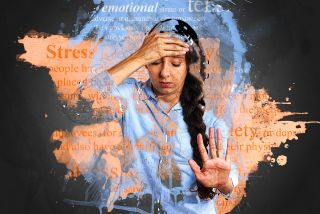Stress
Acute Stress and Cardiovascular Regression Implications
Cognitive and biological responses to acute stress cause cardiovascular decline.
Posted June 5, 2024 Reviewed by Davia Sills
Key points
- Acute stress significantly impacts the sympathetic nervous system (SNS), responsible for stress responses.
- Excessive cortisol activation and inflammation can cause physiological disturbance and bodily dysfunction.
- Chronic stress often leads to cardiovascular regression, such as CAD and other medical concerns.

Significant research studies have identified the relationship between long-term stress and cardiovascular health regression from a medical approach. However, medical approaches have emerged, conceptualizing how psychopathological and physiological conditions reveal underlying causes of mental disorders and medical diseases. According to U.S. News (2024), in today's workforce, medical and healthcare professionals, law enforcement, military service members, and first and emergency responders rank among the most stressful jobs in the United States. Stress continues to emerge as the number-one silent killer: A significant relationship between stress and cardiovascular disease is no longer unavoidable, and failing to address the concern can be deadly.
The cardiovascular effects of acute versus chronic stress
Scientific theories postulate that chronic stress is not the only concern and that acute stress is just as dangerous, with severe medical implications. Chronic stress escalates cortisol levels and inflammation due to the long-term activation of the body’s stress response. Increased cortisol and inflammation eventually cause artery plaque buildup, which can lead to coronary artery disease (CAD) (Lampert, 2024).
CAD, caused by atherosclerosis progression, is one of the most common heart diseases exponentially increasing in populations within the United States. Such medical symptoms include chest pain, lightheadedness, ischemic injury, increased heart rate, indigestion, stroke, heart attack, and heart failure. Chronic stress poses similar symptoms, such as angina, tachycardia, dizziness, indigestion, weight gain, muscle tension, fatigue, and chest pains, to name a few (Yale Medicine, 2024).
Like chronic stress, the biological action of acute stress causes a rapid increase in catecholamines, our “fight or flight” hormones, which are controlled by the sympathetic nervous system (SNS). The SNS is responsible for our immediate response to stimuli, such as emotional or physical stress and cognitive alertness, which is essential in stressful situations. However, excessive adrenaline causes rapid heart and blood pressure rates, resulting in long-term effects that can cause heart damage. This makes it difficult to control the SNS and transfer specific neurotransmitters for relaxation, which the parasympathetic nervous system regulates.
The psychopathological and psychophysiological symptoms of acute stress are just as important, as these signs can lead to medical indicators of disease or illness or exacerbate pre-existing conditions. Common psychopathological factors include increased fear, emotional instability, helplessness, avoidance, anxiety, and irritability, while physiological factors are predicated on numbness, flashbacks, nightmares, and gastrointestinal problems (American Psychological Association, 2022). Regardless, the long-term activation of any psychophysiological traits can lead to cardiovascular disease and other medical conditions like hypertension, joint issues (i.e., arthritis), and metabolic dysfunction (Yale Medicine, 2022). Emerging research links stress to cancer development and even the disruption of cancer remission (Petrinovic, 2023; National Cancer Institute, 2022; Dai et al., 2020; Perego et al., 2020). Prolonged distress of the SNS can lead to PNS dysfunction, causing a depressed biological system.

Dhabhar (2018) studied short-term stress and its effects on the brain, cognitive, and medical concerns. Findings suggested that acute stress increases “cognitive, psychological, and physical performance dysfunction, indicative of brain, musculoskeletal, and cardiovascular function, reappraisal of threat and security, and training-induced stress optimization” (para. 1). As a result, acute stress significantly impacts the body’s immune system and psychological and physical performance, information well-evidenced in experiential studies.
Epidemiological studies examined acute stress as a substantial risk and prognostic indicator in CAD and stroke, independent of traditional causes of cardiovascular disease (Vancheri et al., 2022). Additionally, the psychological implications of acute stress are based on how cognitive events can lead to medical conditions. Cognitive constructs of stress affect specific subcortical brain regions, such as the prefrontal cortex, insula, amygdala, hypothalamus, and hippocampus. Recent research has proved that chronic stress, particularly stress found in PTSD, alters such brain structures due to severe neuropsychopathologies (Chouraeshkenazi, 2023).
There are two forms of psychosocial stress: acute psychosocial stress (APS) and chronic psychosocial stress (CPS). APS is most familiar as a stress response reaction to events, such as exposure to abuse, combat, trauma, violence, and manmade or natural disasters. CPS involves unexpected events within an individual’s everyday life, such as relationship problems, divorce, the death of a loved one, or significant life changes (e.g., the birth of a child, stressful workplace environment, etc.) (Ahmad et al., 2023).
Both forms are likely to have comorbid medical conditions due to many factors (e.g., hereditary, physiological, and longevity of symptomologies). In addition, APS and CPS have higher mortality rates due to the comorbidity of psychiatric or medical conditions. With prevalent stress and cardiovascular regression research, exploring clinical and medical interventions is essential to determining the future course of integrating psychology and medicine. Pharmacological and clinical mediations and collaborative and multidisciplinary approaches are crucial to treating stress and preventing cardiovascular disease and other medical conditions.
References
Ahmad, G., Aldosoky, W., Ong, M., Mir, T. Dar, T. Abohashem, S. (2023). A narrative review on mental stress and cardiovascular disease evidence, mechanisms, and potential interventions. Heart and Mind, 7(2), Apr-Jun 2023. https://doi.10.4103.hm-d-22-00002
American Psychological Association. (2022). Stress won’t go away? Maybe you are suffering from chronic stress. https://www.apa.org/topics/stress/chronic#:~:text=Chronic%20stress%20can%20affect%20both,and%20a%20weakened%20immune%20system.
Chouraeshkenazi, M. M. (2023). Forensic neuropsychopathological analysis on altered brain structures in combat veterans: A systematic review. Taylor & Francis: F1000 Research. https://doi.org/10.12688/f1000research.132840.1
Dai, S., Mo, Y., Wang, Y., Xiang, B., Liao, Q., Zhou, Ming, Li, X., Li, Young, L., Xiang, W., Li, G., Guo, C., & Zeng, Z. (2020). Chronic stress promotes cancer development. Frontiers in Oncology, 10, 1492. https://doi.org/10.3389%2Ffonc.2020.01492
Dhabhar, F. S. (2018). The short-term stress response – Mother nature’s mechanism of enhancing protection and performance under conditions of threat, challenge, and opportunity. Frontiers in Neuroendocrinology, 49(175-192). https://doi.org/10.1016/j.yfrne.2018.03.004
Levine, G. N. (2022). Psychological stress and heart disease: Fact or folklore? The American Journal of Medicine, 135, 688-696. https://doi.org/10.1016/j.amjmed.2022.01.053
National Cancer Institute. (2022). Stress and cancer. https://www.cancer.gov/about-cancer/coping/feelings/stress-fact-sheet
Perego, M., Tyurina, V. A., Tyurina, Y. T., Yellets, J., Nacarelli, T., Lin, C., Nefedova, Y., Kossenkov, A., Liu, W., Sreedhar, S., Pass, H., Roth, J., Vogl, T., Feldser, D., Zhang, R., Kagan, V. E., & Gabrilovich, D. I. (2020). Reactivation of dormant tumor cells by modified lipids derived from stress - activated neutrophils. Science Translation Medicine, 20, 571, 5817. https://doi.org/10.1126/scitranslmed.abb5817
Petrinovic, S. V., Milosevic, M. S., Markovic, D., & Momilovic, S. (2023). Interplay between stress and cancer – A focus on inflammation. Frontiers in Physiology, 14, 1119095. https://doi.org/10.3389%2Ffphys.2023.1119095
U.S. News. (2024). The 20 most stressful jobs. https://money.usnews.com/careers/articles/the-most-stressful-jobs
Vancheri, F., Longo, G., Vancheri, E., & Henein, M. Y. (2022). Mental stress and cardiovascular health – part I. Journal of Clinical Medicine, 11(12), 3353. https://doi.org/10.3390%2Fjcm11123353
Yale Medicine. (2024). Chronic stress. https://www.yalemedicine.org/conditions/stress-disorder


